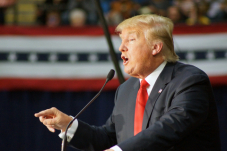
Yet another executive order related to immigration has come from the Trump Administration, this time potentially impacting the H-1B nonimmigrant visa program. Ugh. On April 18, 2017, President Trump signed an Executive Order “Buy American and Hire American.” The Executive Order requires the relevant agencies (e.g., Department of Labor, Department of Justice, Department of Homeland Security, and the Department of State) to review policies related to all visa programs and recommend changes to root out “fraud and abuse,” and to “suggest reforms” so that H-1B nonimmigrant visas are awarded to the most skilled or highest-paid applicants. “Suggest reforms”?
Clients have been calling for months now wondering when the hammer was going to come down on aspects of our immigration system unrelated to enforcement. Well, it looks like it’s about to happen. Ugh again.
The good news is that in the short-term, there should be no immediate changes or impact on the H-1B nonimmigrant visa program. And, if there are changes eventually proposed, in reviewing the President’s Executive Order, many of the changes contemplated will require legislative action, or at minimum, a lengthy regulatory rulemaking process.
But are changes even necessary? Much has been reported in the mainstream conservative media that if it’s not inaccurate, it could certainly benefit from some explanation. For example, many conservative news outlets highlight the rampant fraud in the H-1B program. The simple fact is that demonstrated instances of fraud in the H-1B visa program are actually pretty low. The vast majority of employers that utilize the H-1B program use it appropriately, and specifically because they need the skills and talent of a particular foreign worker. Those who do not can (and should) be rooted out by the current anti-fraud provisions and programs.
There’s also a myth that U.S. businesses hire H-1B workers to save money. That’s simply not true. First of all, the fees and costs associated with filing a petition with U.S. Citizenship and Immigration Services (“USCIS”) are high enough that most employers use the H-1B because they cannot locate a qualified U.S. worker to fill the position in the first place. (There’s also an argument that small businesses simply cannot afford to participate in the H-1B program, so if they do, it’s really because they’re desperate to hire the best available worker they can find.)
In addition, employers are required to pay the H-1B workers the “required wage”, which is the higher of the prevailing wage and the actual wage. So the argument that U.S. businesses hire H-1B workers to save money does not make sense.
In announcing the Executive Order, the President said that H-1B nonimmigrant visas “should include only the most skilled and highest-paid applicants and should never, ever be used to replace American workers.” Without getting into the minutiae of what his statement could end up meaning, U.S. employers who participate in the H-1B program do so because they’re able to hire the most qualified applicant they can find. That makes sense, right?
Notably, one of the changes that pundits think the President may propose is a “prior recruitment” requirement before employers are able to file an H-1B petition with USCIS for a foreign worker. Prior recruitment of U.S. workers is mostly not required in the H-1B program. Where it typically is required are some of the employment-based Green Card categories. For example, in order to file an immigrant (i.e., Green Card) petition with USCIS to qualify a foreign national for some employment-based Green Cards, employers are required to first obtain a certification from the U.S. Department of Labor (“USDOL”) that there are no minimally qualified ready, willing, able and available U.S. workers to do the job that the employer wants to offer the foreign national. “Minimally qualified”! That’s a pretty low standard. It seems to me that that’s not really what employers typically try want to do when they hire someone (i.e., hire someone who’s “minimally” qualified); that is, they try to hire the most qualified individual that they can.
Of course it remains to be seen what will actually come out of this. Any reforms proposed by the Trump Administration as a result of this Executive Order, however, must absolutely ensure that our temporary and permanent worker programs, including the H-1B nonimmigrant, remain viable and available tools for U.S. employers to use who seek to build and maintain a competitive workforce.
